Understanding the Mental Health Challenges of Older Adults
Older adults face unique mental health challenges, including chronic stress, neurocognitive disorders, depression, and substance use disorders. These issues are often intertwined with physical health problems, social isolation, and stigma, complicating diagnosis and treatment. Given the demographic changes and increasing rates of substance misuse in this age group, there is an urgent need for tailored, comprehensive therapeutic approaches. This article explores how therapy and integrated care provide vital support for older adults, helping them cope with chronic stress and addiction through evidence-based treatments, community resources, and holistic strategies.
The Landscape of Mental Health and Substance Use in Older Adults
Prevalence of substance use disorders and mental health issues in older adults
Approximately one in eleven adults over the age of 60 experienced a substance use disorder (SUD) in 2022, highlighting an increasing trend in this demographic. Around one million older adults in the U.S. live with SUDs, yet many do not seek treatment despite the availability of effective interventions. Co-occurring mental health disorders, including depression and anxiety, are common, affecting roughly 20% of older adults. Veterans often experience even higher rates of these intersecting challenges.
Common disorders including neurocognitive disorders and depression
Major mental health disorders prevalent among older adults include neurocognitive disorders such as Alzheimer’s disease and other dementias, major depression, schizophrenia, and various substance use disorders. These conditions are significant contributors to disability and impairment in later life. Research advances are improving diagnosis and treatment, with new FDA-approved therapies for neurocognitive issues and emerging evidence showing that addressing substance misuse may help protect cognitive health.
Challenges in diagnosis due to overlapping symptoms with aging
Symptoms of substance misuse and mental health disorders in older adults frequently overlap or are masked by age-related changes or medical illnesses. For example, physical changes like reduced liver function increase vulnerability to substances, and medication side effects may mimic or hide SUD symptoms. This can lead to misdiagnosis or underdiagnosis, underscoring the importance of routine screening and culturally sensitive, age-appropriate assessments.
What comprehensive treatment services are available for substance abuse and mental health issues?
Comprehensive treatment for older adults integrates evidence-based approaches addressing both mental health and substance use. Treatments include detoxification, individual and group counseling, cognitive-behavioral therapy, motivational interviewing, medication management including medication-assisted treatment (MAT) for opioid use disorder, and relapse prevention programs. Programs are designed to respect older adults’ autonomy and social contexts, improving outcomes.
SAMHSA leads many of these initiatives through substantial funding, such as the State and Tribal Opioid Response grants and campaigns like RecoverMe, which provide tailored resources for substance use and mental health challenges. Additionally, crisis helplines like the 988 Suicide & Crisis Lifeline and the National Helpline offer immediate support.
Integrated care models utilize multidisciplinary teams combining psychiatry, psychology, social work, and primary care to coordinate holistic treatment. Community and family support are also critical for recovery and reducing stigma. These efforts are informed by data from sources like the 2024 National Survey on Drug Use and Health, helping shape responsive and effective interventions.
| Aspect | Details | Significance |
|---|---|---|
| Prevalence | 1 in 11 older adults with SUD, 20% with mental health issues | Growing need for targeted screening and services |
| Common Disorders | Neurocognitive disorders, major depression, substance misuse | Major causes of disability and functional impairment |
| Diagnostic Challenges | Overlapping symptoms with aging, medication effects | Risk of missed or delayed diagnosis |
| Treatment Approaches | Evidence-based therapies, MAT, counseling, integrated multidisciplinary teams | Effective recovery tailored to older adults’ needs |
| SAMHSA Role | Funding grants, campaigns, helplines, data-driven policy support | Enhances access, awareness, and comprehensive care |
| Support Structures | Family involvement, community programs, stigma reduction | Critical for sustained recovery and mental well-being |
Unique Risk Factors and Vulnerabilities in Older Adults
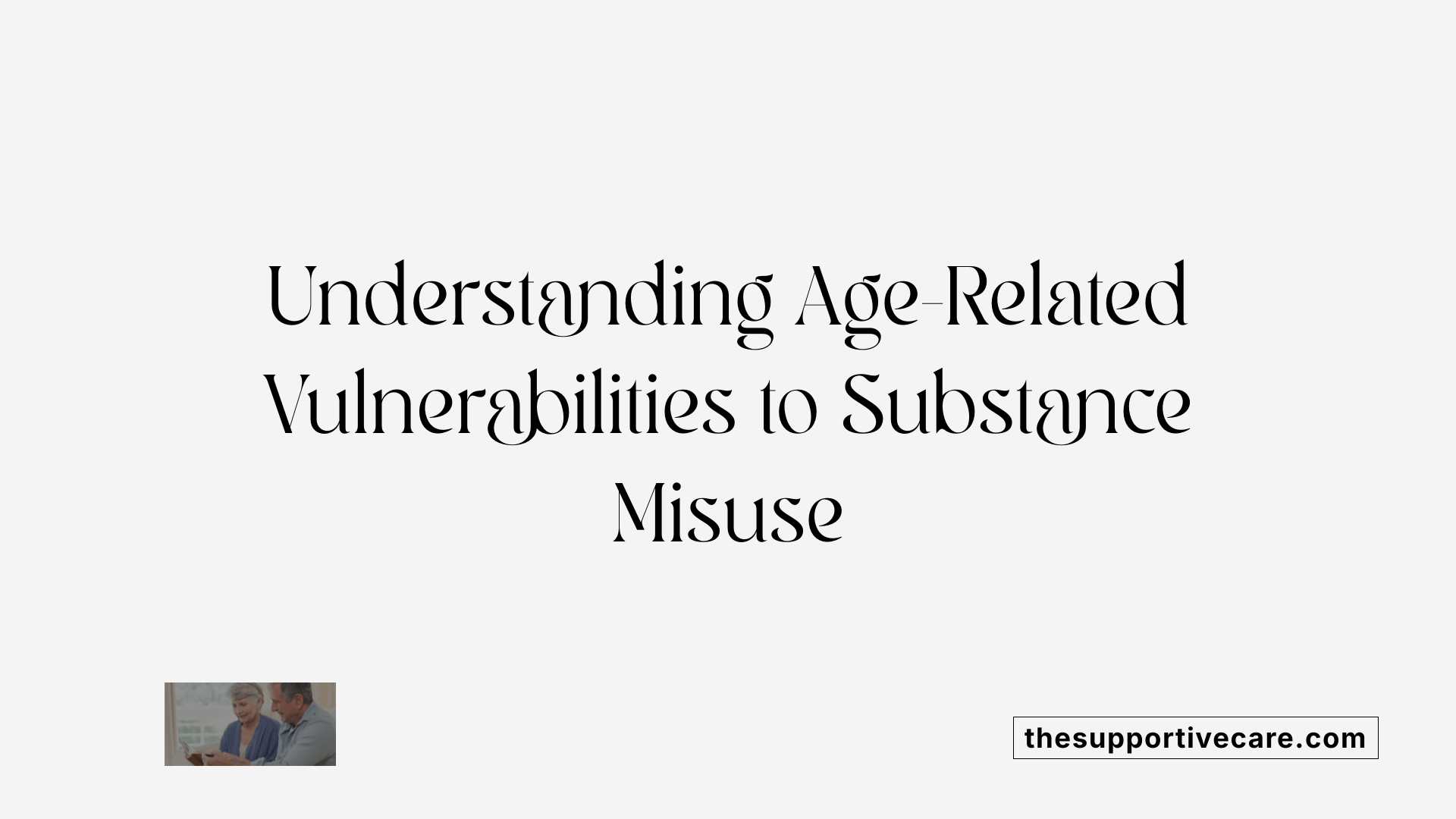
How Do Physiological Changes Increase Vulnerability to Substance Misuse in Older Adults?
As people age, their bodies undergo physiological changes that affect how substances are processed. For instance, decreased liver function and reduced muscle mass mean that older adults metabolize alcohol and drugs more slowly. This slower metabolism increases sensitivity to substances, making even small amounts potentially harmful. These changes heighten the risk for overdose or adverse reactions, especially when combined with other health issues common in aging.
What Life Stressors Contribute to Substance Misuse Risk Among Older Adults?
Older adults frequently face significant life events such as bereavement, retirement, and chronic health problems. These stressors can lead to emotional distress, loneliness, and depression, creating a vulnerable environment for substance misuse. The transition into retirement may alter daily structure and social engagement, sometimes resulting in increased alcohol or drug use as a coping mechanism.
How Do Social Determinants Affect Substance Misuse in Older Adults?
Social isolation and stigma play critical roles in mental health and substance use outcomes for seniors. Many older adults experience loneliness, which can exacerbate feelings of depression or anxiety. Additionally, stigma surrounding addiction often leads to denial or reluctance to seek help. Ageism and misunderstood symptoms may contribute to underdiagnosis and undertreatment, further marginalizing vulnerable individuals.
Recognizing these unique vulnerabilities is essential for tailoring prevention and treatment programs to effectively address substance misuse in the aging population.
Screening and Diagnosis Challenges for Older Adults
Why Are Symptoms of Substance Use Disorders Often Confused with Other Health Issues in Older Adults?
Older adults frequently face challenges when it comes to diagnosing substance use disorders (SUDs), largely because many symptoms mimic or overlap with common medical or age-related conditions. For example, confusion, memory problems, or physical health changes caused by substance misuse can be mistaken for signs of dementia, depression, or general aging. This symptom overlap often leads to misdiagnosis or missed diagnosis, delaying effective treatment.
How Does Medication Use Normalize and Contribute to Underdiagnosis of SUDs in Older Adults?
Another factor complicating diagnosis is the widespread use of prescribed and over-the-counter medications among older adults. This normalization of medication use can mask signs of substance misuse, as clinicians and patients alike may overlook patterns of inappropriate use or dependence. Since symptoms can be subtle or attributed to legitimate prescriptions, substance problems often go unrecognized.
What is the Importance of Routine and Culturally Sensitive Screening for Older Adults?
To address these challenges, routine screening for substance misuse is critical. Screening protocols need to be age-appropriate and culturally sensitive to effectively uncover hidden SUDs in older adults. Tailored screening helps differentiate between medical issues and substance-related problems, enabling earlier intervention. Incorporating routine screening into healthcare visits and training clinicians to recognize specific signs can improve identification and treatment outcomes for this vulnerable population.
This comprehensive approach acknowledges the unique physiology and social factors impacting older adults, promoting better health and recovery pathways.
Evidence-Based Therapeutic Interventions for Older Adults
How do treatment programs address various forms of addiction?
Treatment programs for older adults with addiction issues are carefully tailored to meet individual needs and cater to the complexity of each case. These programs are offered across a spectrum of care settings, including outpatient, partial hospitalization, residential, and inpatient facilities, ensuring flexible options for patients. Medication-Assisted Treatment (MAT) plays a vital role, especially for opioid use disorder, utilizing FDA-approved medications like methadone, buprenorphine, and naltrexone to reduce cravings and ease withdrawal symptoms.
Broadly, programs combine multiple therapies to tackle addiction comprehensively. Cognitive Behavioral Therapy (CBT) is widely used to help clients identify and alter destructive thought patterns related to substance use. Motivational Interviewing (MI) supports patients by enhancing their motivation and commitment to change. These approaches are often complemented by trauma-informed care, recognizing the role of past trauma in substance misuse, and peer support services that provide community and shared experience for encouragement and relapse prevention.
Supportive therapies are especially important in older adults, respecting their autonomy and social conventions to enhance engagement and treatment outcomes. Family involvement, case management, education, and community-based resources are integrated to promote healthier aging and sustain recovery. By addressing mental, physical, and social health needs within a coordinated framework, these evidence-based interventions improve quality of life and reduce relapse risk among older adults living with substance use disorders.
Integrated and Multidisciplinary Care Models
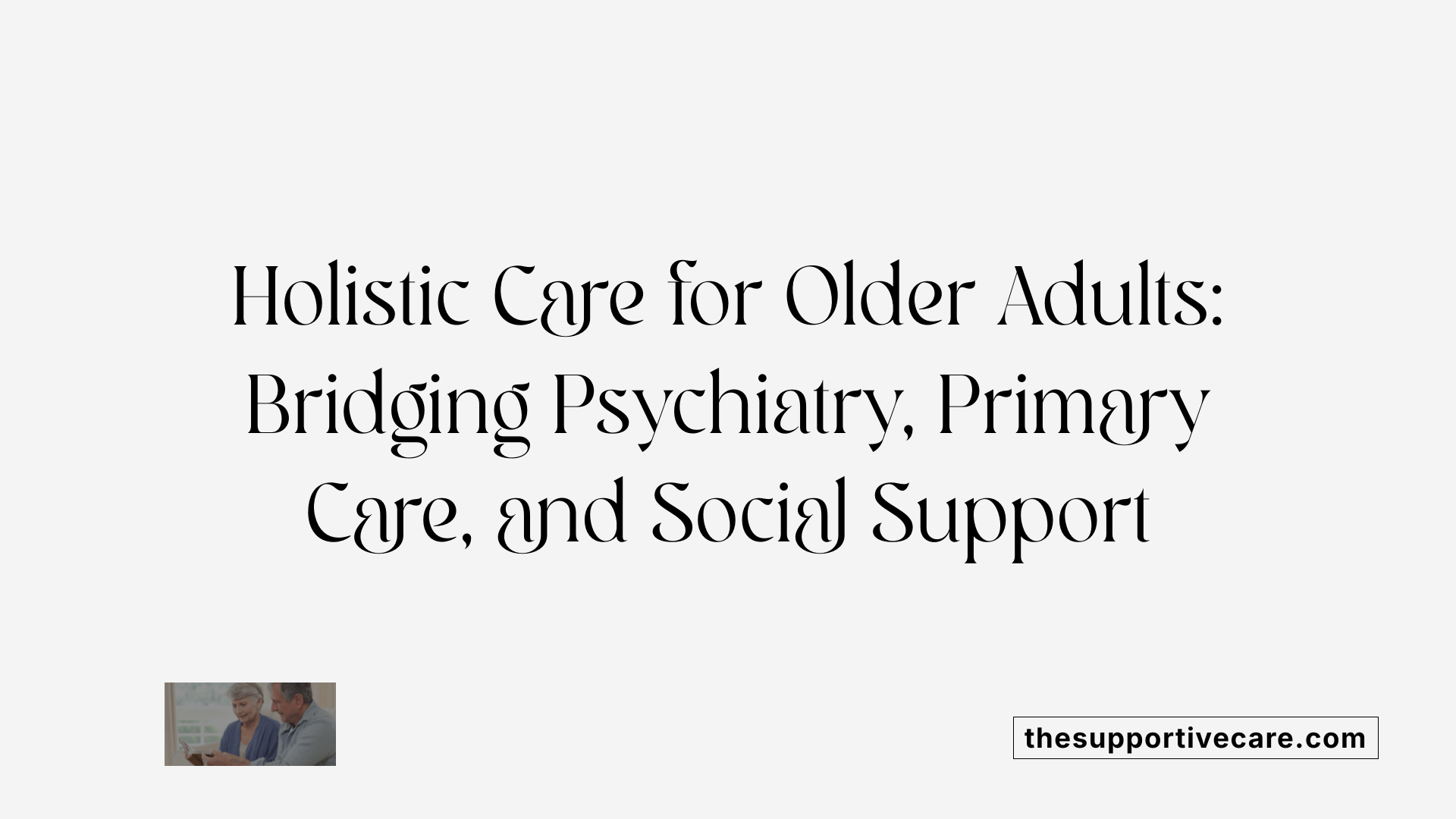
Coordination Across Mental, Physical, and Social Health Services
Effective treatment of mental health disorders and substance use challenges in older adults relies on comprehensive coordination among mental, physical, and social health services. Multidisciplinary team care models emphasize thorough assessment and management strategies that address all aspects of an individual's well-being. This coordination helps ensure that care is holistic, addressing comorbid physical illnesses, psychiatric symptoms, and social determinants such as isolation and stigma.
Role of Psychiatrists, Psychologists, Social Workers, and Primary Care
Multidisciplinary teams typically include psychiatrists, psychologists, addiction counselors, social workers, and primary care physicians. Each professional contributes specialized expertise; psychiatrists manage psychiatric diagnoses and medications, psychologists provide therapeutic interventions such as Cognitive Behavioral Therapy, social workers help navigate community resources and social support, and primary care physicians monitor physical health. This integrated approach helps tailor personalized treatment plans that consider the full scope of older adults' needs.
Benefits for Co-occurring Disorders and Chronic Conditions
Older adults frequently present with co-occurring mental health and substance use disorders alongside chronic medical conditions. Integrated care models enhance treatment outcomes by simultaneously addressing these complex, overlapping challenges. Through multidisciplinary collaboration, patients receive coordinated interventions that bolster adherence, reduce relapse risk, and promote sustained recovery. Such models improve overall functioning and quality of life in this population.
Community Engagement and Social Support Systems
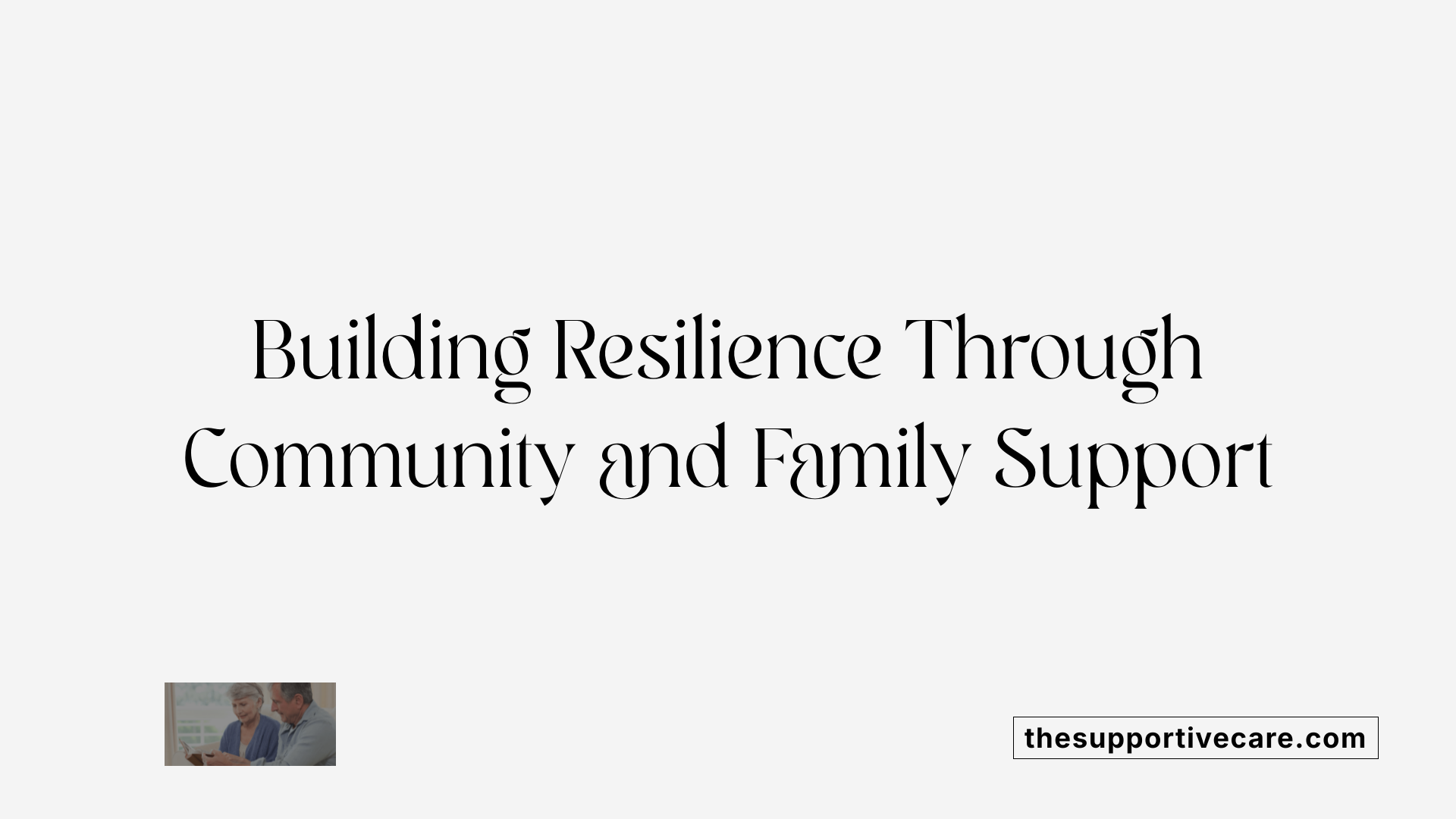
How does social isolation and loneliness impact mental health?
Social isolation and loneliness significantly affect mental health, especially among older adults. These conditions can exacerbate symptoms of depression, anxiety, and cognitive decline, increasing vulnerability to substance misuse. Older adults often experience bereavement, retirement, or reduced social interactions, which intensify feelings of loneliness and lead to worsened mental well-being.
What role do community programs and resilience building play?
Community programs provide vital social engagement opportunities that help reduce isolation and promote mental health. Involving older adults in group activities, educational sessions, and recreational events fosters a sense of belonging and purpose. These programs also support resilience building by encouraging coping skills, social connectedness, and emotional regulation, all of which can buffer against mental health decline and reduce the risk of substance misuse.
Why is family involvement and peer support important?
Family support and peer networks offer emotional encouragement and practical assistance, which are crucial for recovery and sustained mental health. Peer support groups create stigma-free environments where older adults share experiences, enhancing motivation and accountability. Family involvement also helps monitor health changes and supports treatment adherence, contributing to better outcomes in substance use disorder management and aging well.
Together, these social support systems form an essential foundation in fostering healthier aging and mitigating the effects of mental health challenges and addiction risks in older populations.
Innovative Outreach and National Support Initiatives
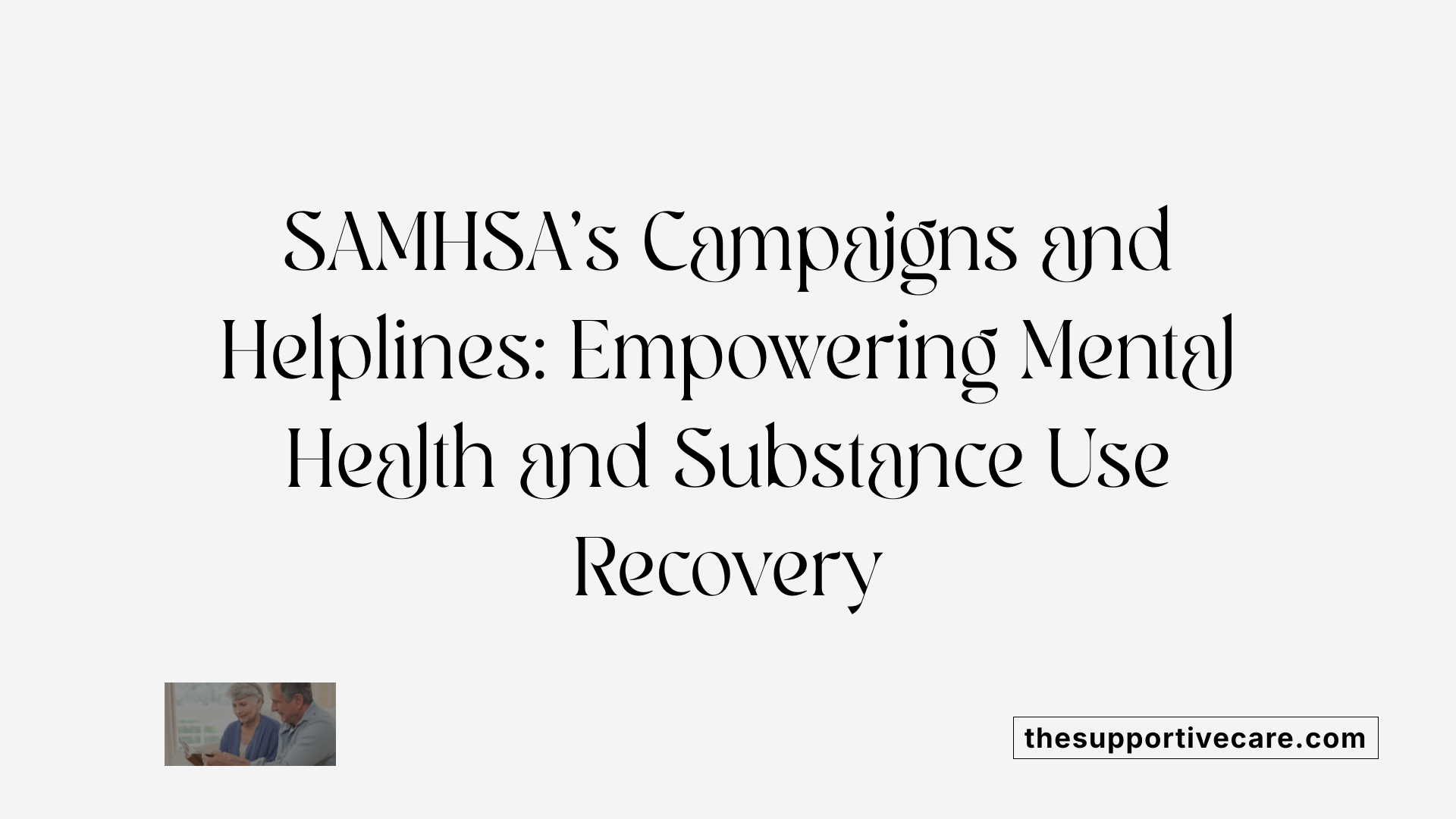
What is SAMHSA’s RecoverMe campaign for young adults transitioning to older age?
SAMHSA’s RecoverMe campaign is designed to connect young adults with vital resources and support for managing substance use and mental health challenges. The campaign uniquely tailors outreach and intervention strategies that resonate with this age group, helping ease the transition as they move into older adulthood. Through education, tools, and supportive messaging, RecoverMe emphasizes resilience and recovery empowerment for those navigating these critical years.
What 24/7 helplines does SAMHSA provide?
SAMHSA offers multiple 24/7 helplines to provide immediate assistance for mental health and substance use crises. Key helplines include:
- National Helpline (1-800-662-HELP): A confidential resource for treatment referrals and information on substance use disorders.
- 988 Suicide & Crisis Lifeline: Provides urgent mental health support and suicide prevention services around the clock.
- Disaster Distress Helpline: Offers crisis counseling and support during natural or man-made disasters.
These helplines ensure that individuals in crisis have constant, accessible help, reinforcing SAMHSA’s commitment to timely and compassionate care.
How does SAMHSA promote prevention campaigns and education efforts?
SAMHSA places strong emphasis on prevention to reduce the onset and consequences of substance use disorders. It promotes Substance Use & Misuse Prevention Month annually to spotlight evidence-based prevention strategies. These efforts include educational outreach, community engagement, and public awareness campaigns focused on reducing risk factors and promoting protective behaviors.
Education also highlights mental health awareness, aiming to reduce stigma and encourage early intervention. SAMHSA’s prevention initiatives play a vital role in decreasing substance misuse and improving public health outcomes comprehensively.
Addressing Stigma and Promoting Positive Psychiatry for Successful Aging
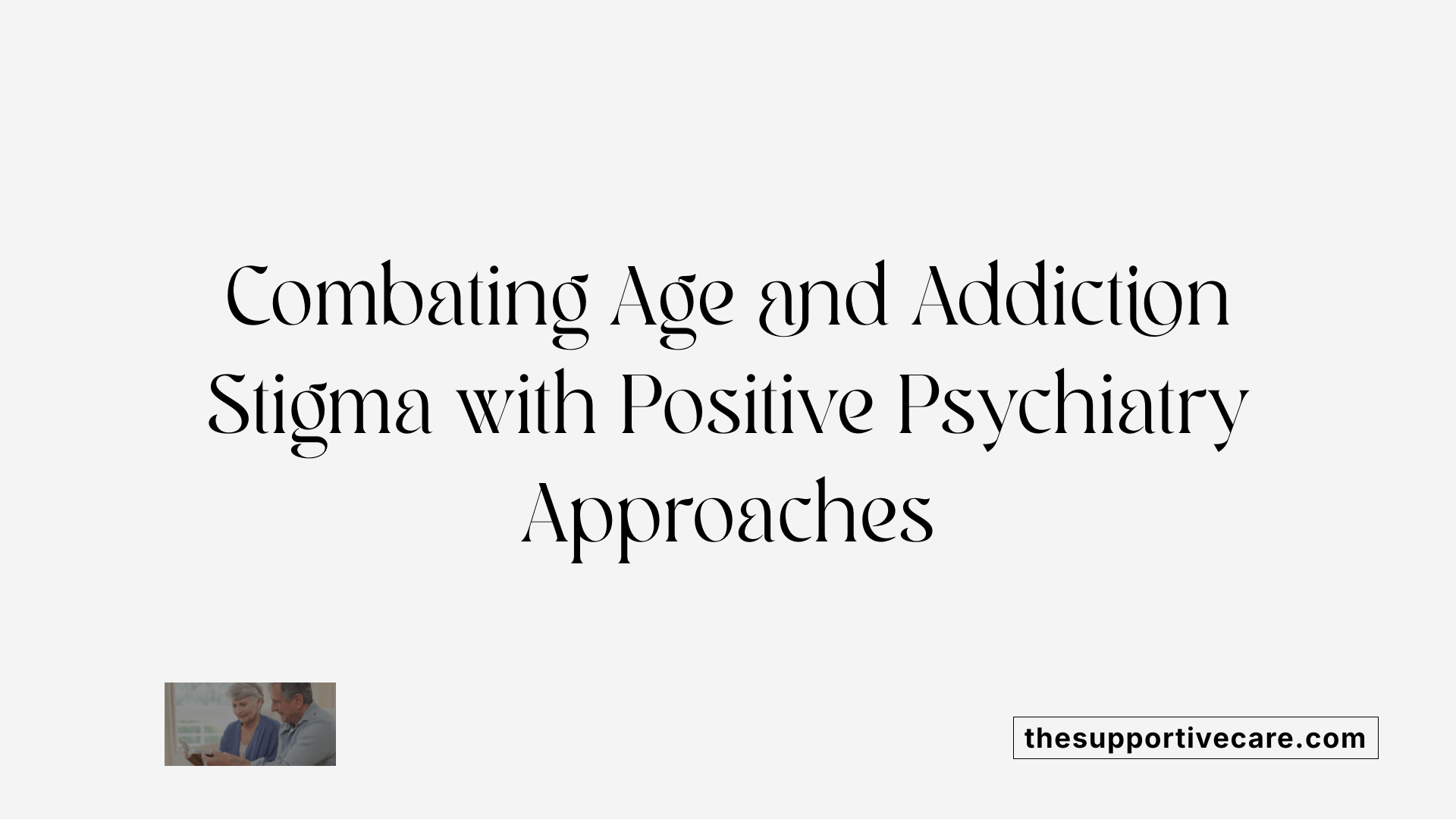
How does SAMHSA address stigma related to aging and addiction?
Stigma surrounding addiction and ageism presents major barriers to older adults seeking help for substance use and mental health disorders. SAMHSA recognizes that these stigmas can lead to denial, underdiagnosis, and reluctance to access treatment. Combatting this requires targeted efforts such as promoting stigma-free group therapies and community support programs that honor older adults' lived experiences with addiction.
What traits are emphasized in positive psychiatry to support mental health in older adults?
Positive psychiatry incorporates traits like resilience, wisdom, finding meaning in life, and active community engagement. These characteristics not only enhance overall well-being but also help reduce the negative impacts of social isolation, loneliness, and discrimination. Strengthening these attributes can buffer against mental health decline and support successful aging.
What are the benefits of positive psychiatry approaches?
Positive psychiatry focuses on fostering strengths rather than only treating illness, which promotes a holistic view of mental health in older adults. This approach encourages building life skills, resilience, and social connectedness, contributing to improved quality of life. It also helps dismantle age-related stigma by emphasizing older adults’ capabilities and autonomy. SAMHSA’s endorsements of such approaches align with evidence showing improved mental health outcomes and enhanced recovery experiences.
Pharmacological Advances and Personalized Treatments
What FDA-approved medications are available for opioid use disorder?
FDA-approved medications play a crucial role in treating opioid use disorder (OUD). The primary medications include methadone, buprenorphine, and naltrexone. These therapies help reduce cravings and withdrawal symptoms, supporting patients in their recovery journey. Medication-assisted treatment (MAT) is proven to lower illegal opioid use and overdose risks, while promoting longer retention in treatment programs.
How are treatments evolving for neurocognitive disorders, including Alzheimer’s disease?
Treatment for neurocognitive disorders is rapidly advancing, especially with recent FDA approval of disease-modifying therapies targeting conditions like Alzheimer’s disease. These treatments aim to slow disease progression rather than just address symptoms. Non-pharmacological options continue to complement drug therapies, focusing on lifestyle changes and cognitive support.
Why is early diagnosis and biomarker research important?
Early diagnosis is critical for managing neurocognitive disorders effectively. Cutting-edge research into biomarkers such as amyloid and tau proteins, along with genetic markers, enhances the accuracy of diagnosis and informs personalized treatments. This progress enables tailored care plans that improve patient outcomes and potentially delay cognitive decline.
The integration of pharmacological advances with biomarker-driven personalized treatments marks a new era in managing both addiction and neurocognitive disorders, particularly for older adults who face unique challenges in these health areas.
Sustaining Recovery and Long-Term Wellness Strategies
Aftercare Planning and Relapse Prevention
Aftercare planning plays a critical role in helping older adults maintain sobriety and prevent relapse. This includes continued engagement in support groups, regular follow-up appointments, and personalized relapse prevention strategies tailored to their medical history and social circumstances. Involving family and peers in aftercare can enhance accountability and provide emotional support, creating a stigma-free environment for sustained recovery.
Lifestyle Modifications and Cognitive Health Maintenance
Adopting healthy lifestyle changes helps protect cognitive health and promotes overall well-being. Recommendations include increasing physical activity, managing vascular risk factors, and engaging in social and community activities to combat isolation and loneliness. Emerging research suggests that reducing substance use may lower the risk of cognitive decline and dementia, underscoring the importance of healthy behaviors in long-term recovery.
Ongoing Monitoring and Community Reintegration
Ongoing monitoring ensures timely identification of potential relapse signs and management of co-occurring mental or physical health conditions. Multidisciplinary teams coordinate care across medical, behavioral, and social services to support holistic wellness. Community reintegration promotes a sense of purpose, resilience, and belonging through involvement in volunteer work, education, and peer support programs, all vital for sustaining long-term recovery in older adults.
Empowering Older Adults Through Compassionate, Holistic Care
Older adults coping with chronic stress, mental health conditions, and substance use disorders benefit profoundly from therapy models that respect their unique needs. By integrating evidence-based treatments, multidisciplinary care, community support, and addressing social determinants like stigma and isolation, recovery and improved quality of life are attainable. Continued investments in research, education, and tailored outreach will empower older adults to achieve successful aging with dignity and resilience.
References
- Home | SAMHSA - Substance Abuse and Mental Health ...
- Mental health care for older adults: recent advances and new ...
- Treating substance misuse in older adults
- Treatment of Substance Use Disorders
- considerations-when-counseling-older-adults-with-sud
- Evidence-Based Practices Resource Center
- Treatment Services for Older Adults with Substance Use ...
- Chapter 5—Specialized Substance Abuse Treatment Programs


































































































